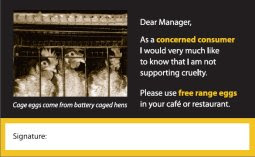The morning started badly – no soy milk for this vegan’s coffee (“we do have skim milk, Sir”). Then it got worse; in announcing the launch of Choose Wisely, RSPCA ACT CEO, Michael Linke, acknowledged the past work of others in seeking to have cages banned in the ACT including the Greens MLA Dr Deb Foskey but, sadly, neglected to acknowledge the ongoing work of AL ACT. He made no mention of AL ACT’s role in the 1997 attempt to legislate against the cages and its more recent “Free Range Canberra” campaign which led to the introduction of last year’s revised Bill by the Greens. Ah well.
“Choose Wisely” is a term that has been used for some time by the RSPCA but now has a new logo and its own website http://www.choosewisely.org.au/. It is intended to persuade organisations to move toward the use of cage-free eggs. Those that do will earn the right to display Gold, Silver or Bronze logos depending on their degree of progress in eliminating cage eggs from their businesses. InterContinental Hotels Group (IHG) was announced as the first ACT business to commit to the move toward cage-free eggs as part of the RSPCA campaign.
The campaign will also encourage consumers to support such businesses and to use RSPCA supplied calling cards at other eateries – leaving them on the table to encourage the café to change its buying habits.
The IHG move will mean some 200,000 eggs per year in the ACT will be RSPCA–accredited cage-free eggs instead of sourced from caged birds. But will that make a difference? The Pace Farm facility in the ACT produces some 60 million eggs per year so even if IHG have been using all ACT eggs up til now the change will only affect about 0.33% of the ACT facility’s output.
This move is more symbolic than practical so it will really only make a difference if it leads other businesses and individuals to change their buying habits. Let’s hope that RSPCA and IHG can get some media coverage.
The Animal Liberation movement and the RSPCA have had their differences – and they continue to do so. According to http://www.rspcawatchdog.org/ (the Animal Lib point of view), “Despite the hard work of volunteers, RSPCA management consistently fails animals.” The RSPCA South Australia site (http://blog1.rspcasa.asn.au/2007/01/12/animal-liberation-front/) gives the other perspective. It says “we fundamentally differ from the animal liberation movement in the methods we use”.
But the differences are not restricted to methodology – the RSPCA also differs from the AL movement in what it regards as cruel. At breakfast this morning after seeing a DVD showing the horrors of battery cages we were invited to enjoy our hot breakfast which included cage-free eggs, bacon and chicken sausages – proclaimed joyously as all ‘cruelty-free’. This is where we differ. The RSPCA believes that it’s ok for humans to use animals – to breed them, incarcerate them, separate mothers from their babies, perform surgical procedures on them, transport them and, of course, slaughter them – as long as it’s all done ‘humanely’.
Does this mean that Animal Liberation and the RSPCA can’t work together? I don’t think so. As an Animal Liberationist I see the RSPCA as on the right track – but just a bit further back. Still, by being more conservative than Liberationists they are more likely to gain support from the general public as well as from politicians and businesses.
The local RSPCA ACT folk have been supportive on the battery cage issue – even if a little ignorant of AL ACT’s efforts and achievements – and I think this initiative deserves AL’s support. They are a far bigger organisation with a lot more money to spend than most Australian AL groups. Besides, once they achieve this goal of finishing off battery cages they will most likely have come to see the cruelty inherent in the barn system and refocus on it.
By the way, had the RSPCA been more aware of AL’s Free Range Canberra campaign they’d have seen that FRC recruited businesses long ago to commit to free range eggs (http://www.freerangecanberra.org/restcafe.htm).
They would also have been familiar with this calling card.

On a final note, after breakfast we were treated to a speech supporting the new campaign by Senator Gary Humphries who has apparently changed his spots somewhat since his days in the ACT Legislative Assembly where in 1997 he opposed the Greens’ Bill to ban battery cages on the basis of the possible loss of the Parkwood facility and its jobs from the ACT as well as “the weaknesses that the alternative schemes of egg production being suggested by the Greens might have in terms of animal welfare”. Good to see you catching up, Senator.

